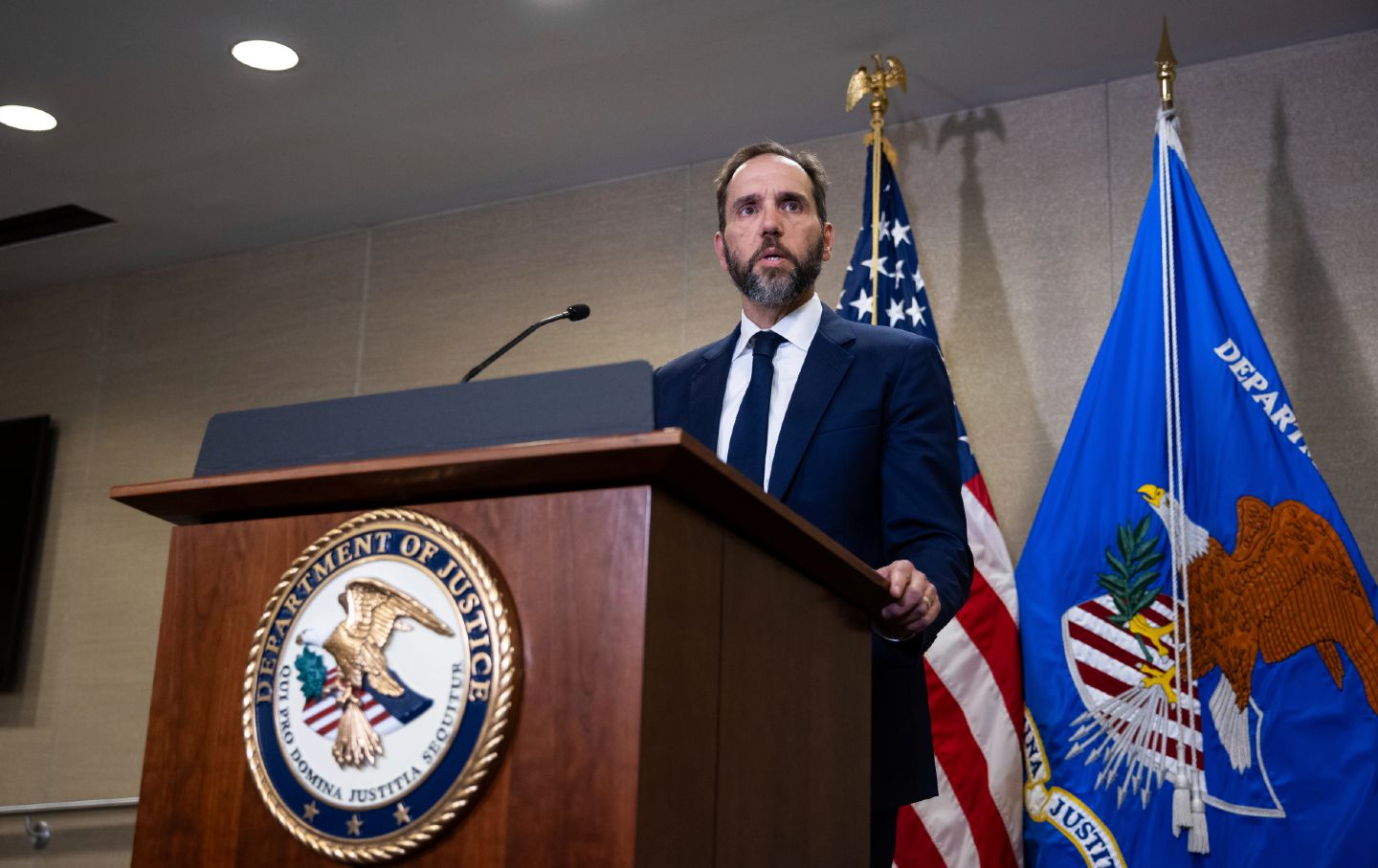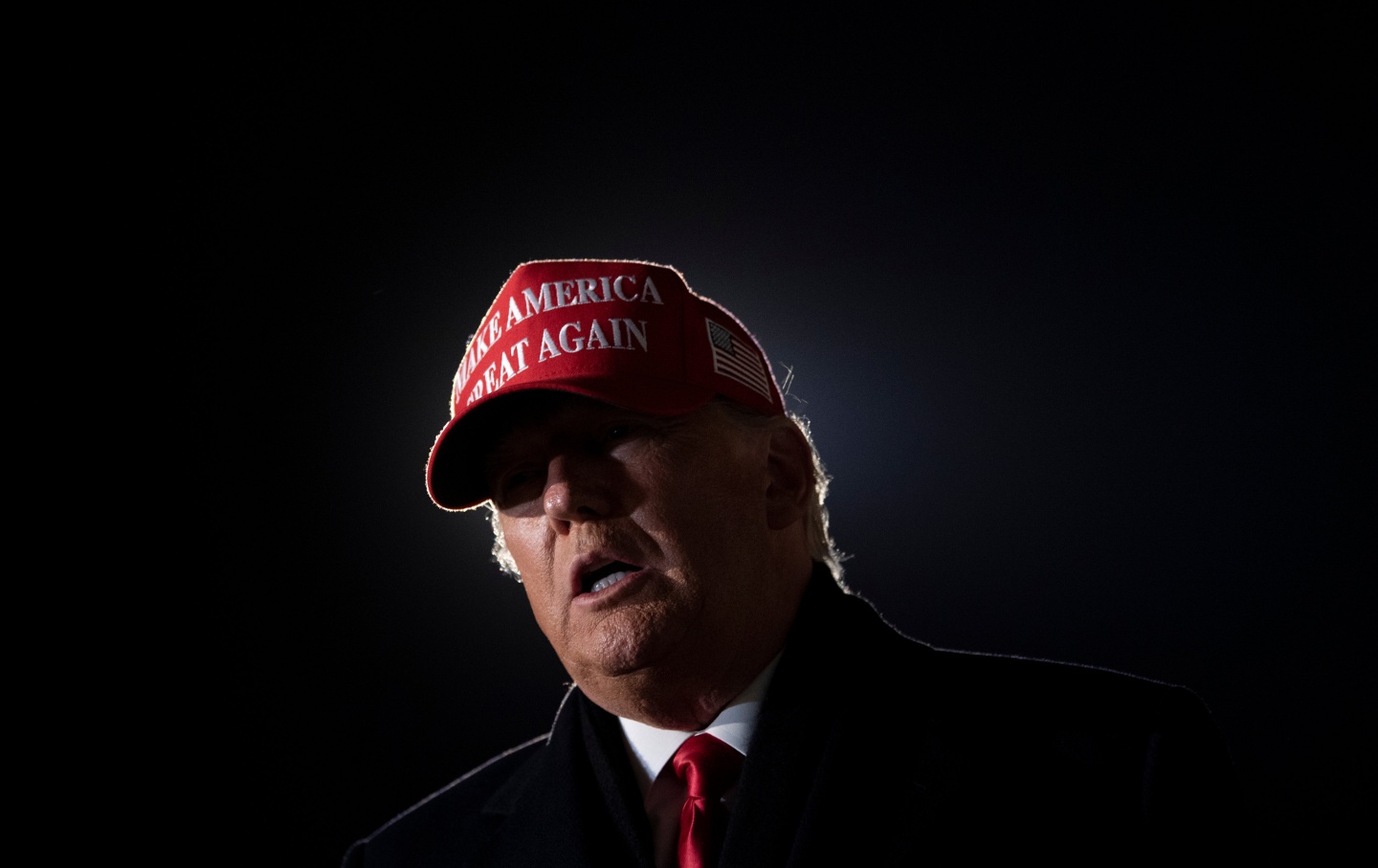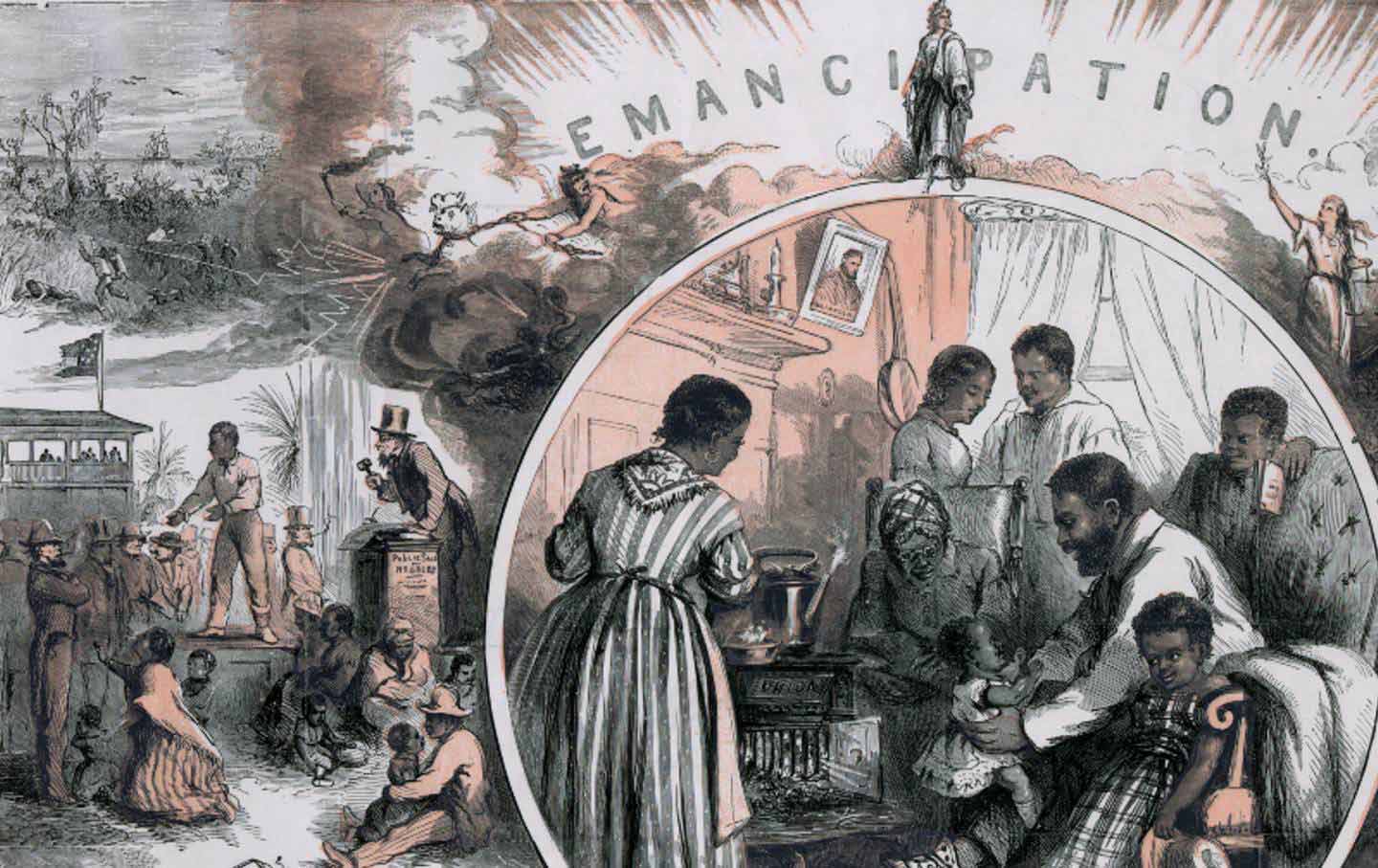Jack Smith Just Pulled a Serious Poker Move in His Case Against Trump
By appealing Donald Trump’s immunity claims to the Supreme Court, Smith is hoping to force the former president’s legal team to have to abandon that defense.

Special counsel Jack Smith makes a statement to the press in Washington, D.C., August 1, 2023, after former president Donald Trump was indicted by a federal grand jury.
(Francis Chung / Politico via AP Images)I used to play a lot of poker. Texas Hold’em specifically. A big part of the strategy in the game is to bet your money when you are winning the hand, before the last cards have been drawn. If you have the best hand—let’s say, a pair of aces—you want to make other players fold before they get additional cards, so they can’t beat you with straights or flushes or other low-probability shenanigans at the end. It’s a gamble, of course. Other players might not fold, and might indeed draw the cards necessary to beat you. But it’s not a bluff: You are winning when you push your chips onto the table. Instead, the player who meets the bet with nothing but cash and hope is the one who’s bluffing, and they’re just praying to get lucky in the end.
Special counsel Jack Smith has made a big bet by taking his case against Trump directly to the Republican-controlled Supreme Court. He’s asked the justices to rule on Trump’s principal defense: that as a former president he is immune to prosecution for crimes he committed while in office. Smith wants the nation’s highest court to issue this ruling before the lower appellate courts have weighed in, and he wants the court to do it quickly, so that he can keep to the scheduled March 4, 2024, trial date; if he’s going to bring Trump to justice before the election, the trial has to begin soon.
It’s a gamble, to be sure, but it’s one he’s likely to win, unless he draws the absolute worst versions of the justices Trump appointed.
For starters, the law is clearly on Smith’s side. Trump’s main argument—that a president can commit crimes and never be held accountable at any time—has no basis in law, and runs counter to the very idea of the rule of law. Even former dictators are subject to criminal prosecution once they are no longer clothed in executive and military power. Either Trump is wrong about this legal point, or the American experiment in democratic self-government has failed. A president simply cannot, say, shoot people on Fifth Avenue and get away with it forever if we are to still call ourselves a country of laws.
Other than Trump himself, the only people who think he has a legal leg to stand on are probably Don Jr., Eric, and the millions of MAGA stans who want to see Trump establish permanent white rule over the country. Legally, this isn’t a close case. But the timing is a different matter. Getting Trump’s ridiculous argument thrown out before it’s too late is really where the action is at.
Trump began by making his bad argument to District Judge Tanya Chutkan, and she appropriately rejected it. He then appealed. Normally, such an appeal (lawyers call it an “interlocutory appeal,” because it’s an appeal that happens while a proceeding is already underway) would be rejected by the court until after the trial—and, more specifically, after a conviction. Only then would an appellate court agree to hear the case and, if it found errors, determine that a conviction should be thrown out. If every motion or ruling resulted in a lengthy appeal, trials would almost never happen.
But Trump is demanding that he not be tried like a “normal” defendant. He claims that he is special, and should be treated to hearings on his appeals before his trial takes place, instead of after the fact. And the entire reason he is doing this is to delay the trial long enough that it never happens. The strategy is simple. Step one: appeal his case to the appellate court. Step two: when the case loses (and to be clear, the D.C. appellate court will likely rule that Trump’s legal notions are ludicrous), appeal that loss to the Supreme Court, creating an additional delay.
Smith is asking for an expedited Supreme Court review by using Trump’s argument against him. The crux of his request is: “Trump says he’s special, so let’s treat him specially.” It’s a bit of legal ninjutsu: The Supreme Court was always going to be asked to weigh in on Trump’s alleged immunity; Smith is just arguing that, in this special case, the Supreme Court should step in and rule on a timeline that supports justice, instead of one that supports delay.
Whether the Supreme Court will go for that is the gamble. The court has ordered Trump’s lawyers to respond to Smith’s request on an expedited schedule—by December 20—and that is a good sign. But it still takes four justices to agree to hear a case.
Arguably, the three liberal justices are all in on hearing and dispensing with Trump’s ridiculous argument. Is there a fourth? Will Chief Justice John Roberts, who likes to think of himself as a person who keeps the court out of what he perceives to be political controversies, vote for the court to step into this case when it could just ignore it, clearing the way for Trump to win the presidency and make the prosecution moot by establishing himself as a dictator? Will any of the justices Trump appointed—Neil Gorsuch, alleged attempted rapist Brett Kavanaugh, or Amy Coney Barrett—side against the man who elevated them?
There’s every reason to believe that, should the court ever rule on the merits of Trump’s argument, Trump will lose, 7-2. But I don’t know if there are four votes to hear the case (and potentially rule against Trump) now, instead of allowing Trump to delay his reckoning in a manner that is most helpful to him politically.
While we’re here, it simply must be said that one of the two justices Trump can certainly count on should recuse himself. Clarence Thomas’s wife, Ginni, actively supported the crimes Trump is being charged with. Thomas shouldn’t be allowed within a yacht’s length of this case.
Democrats have already called for Thomas to recuse himself, but it’s ultimately Thomas’s decision on whether to besmirch these proceedings with his presence. My guess is that he’s not going anywhere, even though he should. As for bloviating Fox News uncle Samuel Alito, there is, sadly, nothing we can do about him.
With as many as five justices potentially in the Trump column, there’s always a chance that Smith could lose this gambit: The Supreme Court could preemptively rule that Trump is immune from any prosecution. But I would argue that even a ruling in favor of Trump would be better now than later. If the Supreme Court is going to bail Trump out, they might as well get it over with. Spare everybody the show of putting Trump through a trial.
One of the things compulsive gamblers understand about poker is that it’s a game of information gathering. You’re trying to figure out what cards the other players have, and you use bets to make those players reveal the strength of their hands. Jack Smith has placed a bet designed to reveal whether Trump has the Supreme Court up his sleeve.
That’s information the entire country needs. Thanks to Smith, we’re about to find out.
We cannot back down
We now confront a second Trump presidency.
There’s not a moment to lose. We must harness our fears, our grief, and yes, our anger, to resist the dangerous policies Donald Trump will unleash on our country. We rededicate ourselves to our role as journalists and writers of principle and conscience.
Today, we also steel ourselves for the fight ahead. It will demand a fearless spirit, an informed mind, wise analysis, and humane resistance. We face the enactment of Project 2025, a far-right supreme court, political authoritarianism, increasing inequality and record homelessness, a looming climate crisis, and conflicts abroad. The Nation will expose and propose, nurture investigative reporting, and stand together as a community to keep hope and possibility alive. The Nation’s work will continue—as it has in good and not-so-good times—to develop alternative ideas and visions, to deepen our mission of truth-telling and deep reporting, and to further solidarity in a nation divided.
Armed with a remarkable 160 years of bold, independent journalism, our mandate today remains the same as when abolitionists first founded The Nation—to uphold the principles of democracy and freedom, serve as a beacon through the darkest days of resistance, and to envision and struggle for a brighter future.
The day is dark, the forces arrayed are tenacious, but as the late Nation editorial board member Toni Morrison wrote “No! This is precisely the time when artists go to work. There is no time for despair, no place for self-pity, no need for silence, no room for fear. We speak, we write, we do language. That is how civilizations heal.”
I urge you to stand with The Nation and donate today.
Onwards,
Katrina vanden Heuvel
Editorial Director and Publisher, The Nation








